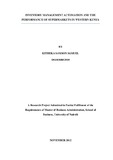| dc.description.abstract | In today’s highly competitive business environment, organizations are striving to
achieve effectiveness, cost efficiencies and economies of scale. Most of these
organizations hold inventory so as to meet their customers’ needs. However,
managing these inventories in order to achieve their objectives has posed a great
challenge to the firms. Many firms have not yet established how much to invest in
inventories and the right inventory levels to hold so as satisfy customers.
Organizations have therefore turned to using modern technology to overcome such
challenges. Specifically, the study sought to address the following two objectives; to
establish the extent of inventory management automation and to determine the effect
of inventory management automation on the performance of supermarkets in
Western Kenya. The study employed a survey design and targeted all the
supermarkets in Kisumu, Kakamega and Bungoma. Data was collected from 11 out
of the 12 operational supermarkets and a response rate of 90.9% was achieved. Data
was gathered using structured questionnaires and analysed using both descriptive and
inferential statistics, with the help of Statistical Package for Social Sciences (SPSS).
The findings of the study revealed that inventory management automation affected
the performance of the supermarkets and that there was a positive linear relationship
between inventory management automation and the performance of the
supermarkets. The linear regression model used revealed that 56.7% of the
supermarkets’ performance could be explained by inventory management automation
(r2=0.567). The extent of inventory management was found to be high among the
supermarkets, with an overall mean score of 3.94, and the performance was also
found to be high with an overall mean score of 4.1both variables being rated on a
scale of 1 to 5. The study recommended that supermarkets should automate their
inventory management systems so as to improve customer service delivery levels and
reduce operational costs. It was also recommended that the supermarkets should
decentralize their management structures, encourage specialization of labour and do
enough research before investing in any new technology. The study suggested that
further research should be conducted on the effect of inventory management
automation on inventory investment and profits, effect of automation on demand
forecasting accuracy as well as challenges faced by the supermarkets in automating
their inventory management systems and how to overcome them. | en |

